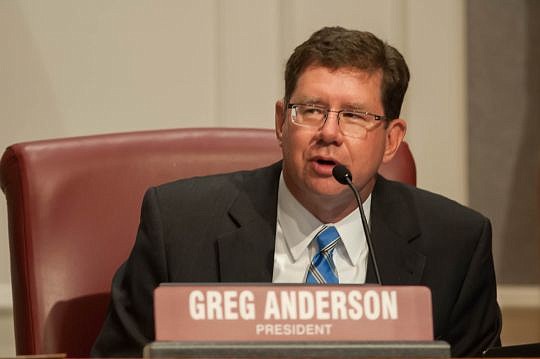
After nearly nine months of discussion about renegotiating the contribution agreement between the city and JEA, City Council President Greg Anderson presented Tuesday a new formula for the calculation.
“We need to get something in the hopper,” he said to the Special Committee on the JEA interlocal agreement about legislation he later introduced at Tuesday night’s council meeting.
The legislation proposes a contribution for fiscal year 2017-18 of $114 million based upon 6.2 percent of JEA’s average gross revenue from fiscal years 2013-15. The legislation also sets that figure as a minimum required per year.
The legislation states the calculation based on gross revenue would be in effect until Sept. 30, 2023.
“It’s a pretty simple way to look at it,” said Anderson.
Changing the JEA contribution calculation will require amending the city charter. Anderson described the bill as a “placeholder” intended to conform to the public hearing schedule requirements to meet the April 30 deadline for an amendment.
Council member Lori Boyer’s immediate response was she’d be concerned about basing JEA’s contribution on gross revenues because rates are at the sole discretion of the public-owned utility’s board of directors.
She said lower rates could improve customer satisfaction, which is one of the parameters JEA uses to evaluate its performance. But that in turn would reduce the utility’s annual contribution if gross revenue decreased.
“That’s why the minimum is important,” said Anderson.
Boyer also said property tax exemptions should be considered when calculating JEA’s contribution. Real property owned by JEA and the independent aviation and transportation authorities is exempt from ad valorem taxes.
“When JEA acquires land, it takes it off the tax rolls,” said Boyer. “The city needs a quid pro quo for real estate tax exemptions.”
Paul McElroy, JEA CEO, said if property tax exemptions are an issue for council in determining a new calculation, the utility would agree to waive the exemption.
“We’d be happy to codify that we would not participate in anything that would take property off the tax rolls,” he said.
Anderson said he intends the proposed formula to be “a platform” for the committee to use as it works on the charter amendment.
The committee also considered options for financing the expansion of the sewer system to eliminate the use of septic tanks, estimated to cost about $300 million.
Assistant General Counsel Jody Brooks said JEA is prohibited from using revenue from water and sewer service to mitigate septic tanks because covenants on JEA’s bonds require that all revenues from the water and sewer system be used to pay off the bonds.
JEA is empowered under city code to levy special assessments for installation of sewer service, based on total construction cost divided by the number of property owners who would benefit, Brooks said.
Nancy Kilgo, JEA director of government relations, said about 15 years ago the St. Johns County Commission implemented a large-scale septic tank replacement program in Ponte Vedra Beach.
The commission approved a special assessment for 700 property owners who benefited from the $8.5 million project. The county required the property owners to participate through either a one-time payment for their share or a 20-year payment plan with the annual installment added to their property tax bill.
Committee Chair Bill Gulliford said septic tanks would be a “carryover issue” for the next meeting.
“Unless Uncle Sam drops $300 million in our laps — and they (the government) don’t have the money,” he said.
(904) 356-2466